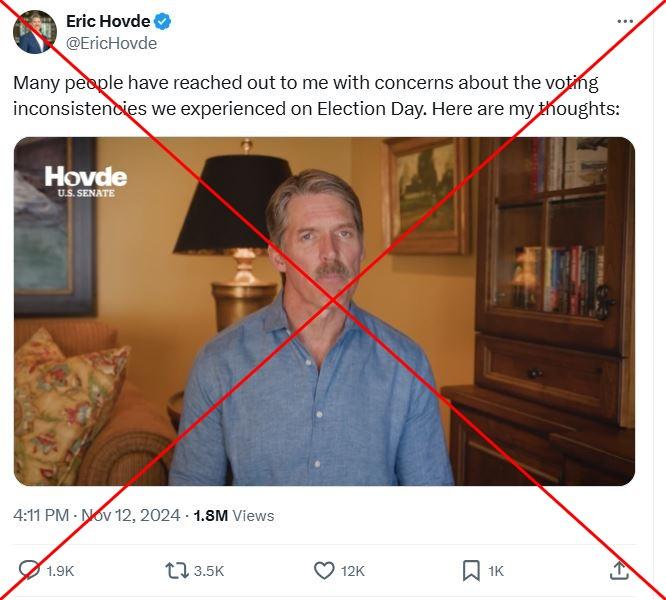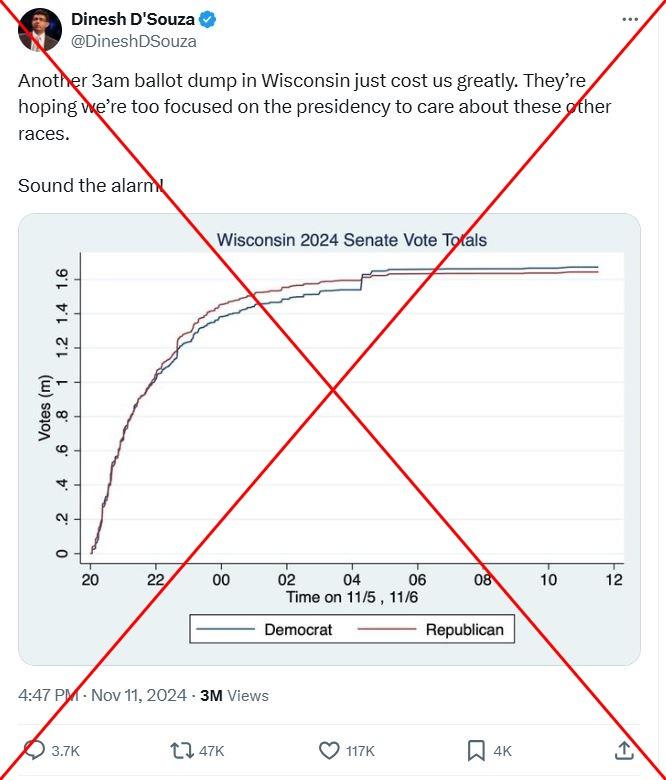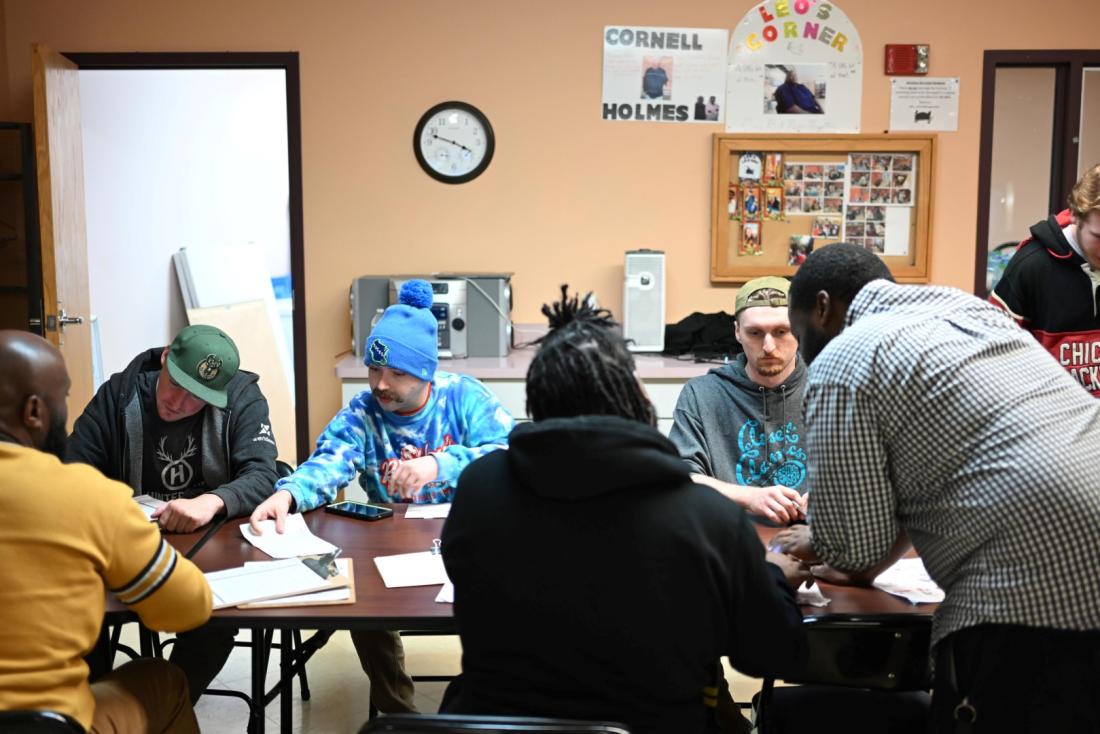
Wisconsin officials, experts refute fraud claims in US Senate race
- This article is more than one year old.
- Published on November 18, 2024 at 17:57
- Updated on November 18, 2024 at 23:09
- 5 min read
- By Daniel Patrick GALGANO, AFP USA
"At 1 am, I was receiving calls of congratulations, and based on the models, it appeared I would win the Senate race. Then at 4 am, Milwaukee reported approximately 108,000 absentee ballots with Senator Baldwin nearly 90 percent of those ballots," Hovde says in a video shared November 12 on X.
"Statistically, this outcome seems improbable."
In the four-and-a-half-minute video, he also claims officials failed to "clean up" voter rolls, saying eight million people are registered to vote in Wisconsin out of a voting-age population of under five million.
Far-right commentator Dinesh D'Souza, who has previously shared misinformation, amplified the claims in a November 11 X post. It includes a line graph showing an uptick in votes for Baldwin just after 1000 GMT, overtaking Hovde's previous lead.
"Another 3am ballot dump in Wisconsin just cost us greatly," D'Souza said. "They're hoping we're too focused on the presidency to care about these other races. Sound the alarm!"


The same claim has circulated elsewhere on X, Facebook, Instagram, Threads, TikTok, YouTube and Gettr.
With more than 95 percent of votes recorded as of 1500 GMT on November 18, Baldwin had received 49.4 percent of the vote compared to Hovde's 48.5 percent. President-elect Donald Trump also beat Democratic Vice President Kamala Harris in the state by around 30,000 votes (archived here).
Hovde conceded his election loss and said he would not ask for a recount in a November 18 X post, but continued to question the validity of Milwaukee's absentee vote count.
Unofficial results from Milwaukee, Wisconsin's largest city, show Baldwin received 80.9 percent of roughly 109,000 absentee votes compared to 80.6 percent for Harris and about 84 percent for President Joe Biden in 2020 (archived here).
The Wisconsin Election Commission has refuted Hovde's claims of wrongdoing, saying in a November 14 statement that the late-night reporting of absentee votes in Milwaukee was "expected" and "communicated to the public before Election Day" (archived here).
"The accusations of large-scale 'ballot dumps' in the middle of the night in cities such as Milwaukee stems from a misunderstanding of how the counting process works following a statewide election," the commission said.
The Milwaukee Election Commission (MEC) has also rubbished Hovde's claims, telling AFP that his "accusations lack any merit" and are "baseless."
"Every aspect of the MEC's operations was conducted with transparency and in strict adherence to established laws and procedures," officials said in a November 13 email.
AFP contacted the Hovde campaign for comment, but no response was forthcoming.
'Usual tradition'
Jerald Podair, a professor of history and American studies at Lawrence University (archived here), said Milwaukee's late reporting of absentee votes is a "usual tradition" in Wisconsin politics and that most candidates know to wait before declaring victory.
He said state law prevents officials from counting absentee ballots before Election Day, often leading to delays (archived here).
"Milwaukee is a big county -- it is not the most efficient place in the world, and so traditionally, they dump their ballots at three in the morning, basically because that's when they're done," he said November 14.
John Johnson, a research fellow at the Marquette Law School Lubar Center for Public Policy Research and Civic Education (archived here), said people who claim there were "irregularities" in the Wisconsin Senate election are "simply lying."
"The number of ballots that are reported at the end of that central count process is public information and known by everyone who's paying attention when the polls close on Election Day," he said November 14.
Local media reported city officials took custody of the final absentee ballot count at about 0924 GMT on November 6, before uploading its results webpage at around 1030 GMT.
Same-day registration
Wisconsin is one of many states that allow people to register to vote on Election Day. Officials ask voters for proof of residence and photo IDs before submitting their ballots (archived here).
As a result, some Wisconsin precincts may report more ballots than the number of voters registered before Election Day. But the Wisconsin Election Commission said that is usually because people recently moved to the area and is not evidence of wrongdoing.

"There can never be more voters who cast a ballot in a jurisdiction than there are voters who are registered to vote in that jurisdiction, once a final number of registered voters for that jurisdiction has been calculated," the agency said in a separate November 14 statement, adding that no city wards reported more than 100 percent voter turnout this year (archived here).
Podair of Lawrence University said absentee ballots and votes from same-day registrants in Milwaukee generally favor Democratic candidates, partially because party volunteers hold registration drives almost until the polls close.
"We have to distinguish between hardball politics and illegal politics," he said.
Voter rolls
The Wisconsin Election Commission said in a third statement that the state only had about 3.65 million active registered voters as of November 1. Hovde misleadingly claimed around eight million people were on voter rolls (archived here).
Another "inactive" list includes around 4.3 million people, according to the agency -- most of whom have died, moved to another state, been convicted of a felony or are otherwise ineligible to vote.
"Wisconsin does not delete voter records. This means the total number of people on the inactive list will continue to grow over time, as additional voter records are created and deactivated through people's lifespans," the commission said.
Wisconsin law allows statewide candidates to request a recount if the margin of victory is no more than one percent, but they must cover some of the cost of the recount if it is above a quarter of a percent (archived here).
Ryan Weichelt, an elections expert and professor of geography at the University of Wisconsin-Eau Claire (archived here), said complaints about Milwaukee's vote count surface in almost "every election" and that recounts rarely change the results.
AFP has debunked other claims about the 2024 US election here.
This story was updated to include Eric Hovde's November 18, 2024 concession statementNovember 18, 2024 This story was updated to include Eric Hovde's November 18, 2024 concession statement
Copyright © AFP 2017-2026. Any commercial use of this content requires a subscription. Click here to find out more.
Is there content that you would like AFP to fact-check? Get in touch.
Contact us




